Overview
Navigating government assistance for autism can feel overwhelming, but understanding the various programs available, such as Medicaid and Supplemental Security Income (SSI), is crucial. These programs offer essential financial aid and healthcare services to families, providing a lifeline during challenging times. It's important for parents to familiarize themselves with eligibility requirements and gather the necessary documentation. By following a structured application process, you can effectively access the resources and support systems designed to help your family.
As you embark on this journey, remember that you are not alone. Many parents face similar challenges, and sharing experiences can be incredibly helpful. Consider reaching out to local support groups or online communities where you can connect with others who understand what you’re going through. Together, you can navigate the complexities of these programs and find the support you need.
Take the first step today. Explore the available resources, gather your documents, and don’t hesitate to ask for help. Your family's well-being is worth the effort, and there are compassionate individuals and organizations ready to assist you along the way.
Introduction
In a world where autism awareness is blossoming, understanding the landscape of government assistance becomes essential for families navigating this heartfelt journey. With a variety of resources available—from financial aid to specialized healthcare services—these programs are thoughtfully designed to enhance the quality of life for children with autism. As we look ahead to 2025, key initiatives like Medicaid and Supplemental Security Income (SSI) play a pivotal role in providing vital support. However, many families remain unaware of the full spectrum of options at their disposal.
This article delves into the intricacies of government assistance for autism, exploring eligibility requirements, application processes, and the invaluable resources that can empower families to advocate effectively for their children's needs. By shedding light on successful case studies and innovative methodologies, it aims to equip readers with the knowledge necessary to unlock the potential of these essential programs. Together, we can navigate this journey and ensure that every child receives the support they deserve.
Understanding Government Assistance for Autism
A variety of resources, including financial aid, healthcare services, and educational support, are part of government assistance for autism, all designed to enhance the quality of life for children with autism. In 2025, essential initiatives such as Medicaid and Supplemental Security Income (SSI) continue to be crucial for families seeking support. Additionally, various state-focused initiatives have emerged, providing tailored assistance that addresses local needs.
Recent data indicates that around 40% of households with autistic children access some form of government aid. This statistic underscores the vital role these services play in delivering essential resources. Understanding the eligibility requirements and benefits of both federal and state initiatives is important, as they can differ significantly. For instance, Medicaid offers comprehensive healthcare coverage, while SSI provides financial assistance to households with limited income.
It's essential to recognize that a child placed in an enrollee's residence by a welfare agency under an agreement where the agency maintains oversight is not considered a foster child for coverage, which can impact eligibility.
Successful examples of families obtaining government assistance for autism highlight the effectiveness of these initiatives. One notable case involved a family in California that utilized state-specific programs to secure funding for specialized therapies. This support led to significant improvements in their child's communication skills. Such stories resonate with specialists who emphasize the importance of a balanced approach to incorporating aid services for individuals with developmental disorders. This perspective aligns with the findings of Billard et al., who discussed the outcomes of the Robota project focused on innovative strategies.
Moreover, ongoing research underscores the need for continuous evaluation of these assistance initiatives. A recent study on audio-visual integration in children with ASD demonstrated how innovative technologies can enhance speech-related skills. This highlights the potential for government-funded initiatives to adopt advanced methodologies. The body of research points to the necessity for a balanced strategy in AI integration within autism assistance, which is crucial for the effective implementation of these initiatives.
In summary, understanding the landscape of government assistance for autism in 2025 is vital for families navigating these services in the U.S. By familiarizing themselves with available resources and successful case studies related to government assistance for autism, families can more effectively advocate for their children's needs and unlock the potential for improved outcomes.
Exploring Financial Assistance Programs
Families of children with developmental disorders can find solace in the government assistance available for autism, which offers various financial aid options designed to alleviate the costs associated with care and support. Here are some key programs that can make a difference:
- Supplemental Security Income (SSI): This program provides monthly payments to eligible children with disabilities, including autism. As we look ahead to 2025, statistics indicate a significant number of SSI recipients are children diagnosed with developmental disorders, highlighting the program's vital role in offering financial support. According to Autism Speaks, individuals with autism may qualify for government assistance, including SSI, to help ease their financial burdens.
- Medicaid: For low-income households, Medicaid offers essential health coverage, including various services related to developmental disorders. Current data reveals that Medicaid covers therapies like Applied Behavior Analysis (ABA), which is crucial for many children with autism.
- State-Specific Grants: Many states have established their own initiatives to provide government assistance for autism, aimed at helping families with therapy, educational resources, and other critical needs. For instance, the Autism CARES Act allocates funding for numerous autism-related services, ensuring that families can access the resources they need.
In addition to these programs, families can take advantage of technology assistance initiatives. Various organizations provide grants to help families acquire devices such as iPads, which can significantly enhance communication and education for individuals with autism. Access to such technology has proven to improve developmental outcomes, making it a valuable resource for many families.
For more information on technology resources, individuals can explore Autism Speaks' Technology Central page.
Parents are encouraged to thoroughly research these options and apply as soon as possible to secure the necessary funding. Engaging with community-based organizations (CBOs) can also provide additional support, as families are encouraged to meet with their CBO Case Manager at least once every quarter to discuss available resources and assistance.
By understanding and utilizing government assistance for autism, families can navigate the challenges associated with developmental disorders more effectively, ensuring their children receive the support they need.
Special Needs Financial Planning Tools
Effective financial planning is not just a necessity; it’s a lifeline for households with children who have autism and rely on government assistance. Understanding the unique challenges you face, let’s explore some essential tools and strategies that can help you navigate this journey with confidence.
-
Special Needs Trusts: These trusts are a wonderful option, allowing families to set aside funds for their child's future without jeopardizing eligibility for vital government benefits. Imagine the peace of mind that comes from knowing your child’s needs are secured.
-
ABLE Accounts: These tax-advantaged savings accounts empower individuals with disabilities to save money for qualified expenses while preserving their benefits. It’s a practical way to ensure your child has the resources they need for a fulfilling life.
-
Financial Planning Services: Consulting with a financial planner who specializes in special needs can be transformative. They can help you create a comprehensive plan tailored to your unique circumstances, providing clarity and direction in what can often feel overwhelming.
Utilizing these tools can truly provide peace of mind, ensuring that your children receive the necessary support throughout their lives. Remember, you are not alone in this journey; there are resources available to help you every step of the way.
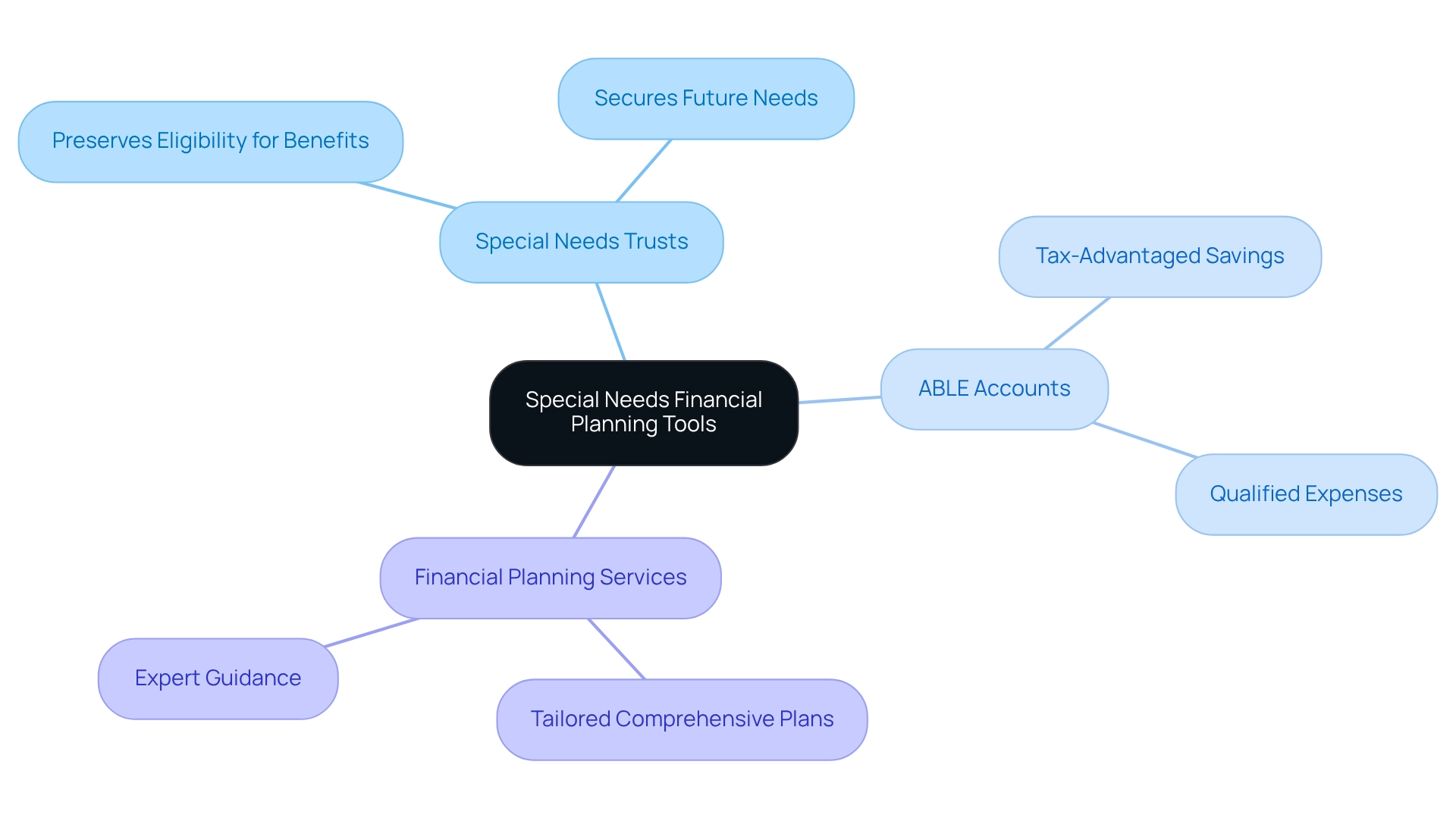
Eligibility Requirements for Assistance Programs
Navigating the eligibility for government aid initiatives can be a daunting experience for families. It's important to understand that these criteria can differ significantly, and knowing what to look for can make a world of difference. Here are some common criteria that you might encounter:
- Income Limits: Many programs, such as SSI and Medicaid, set specific income thresholds that families must meet to qualify for assistance.
- Diagnosis Requirements: To access government support for autism, a formal diagnosis of autism or related conditions is often necessary. This requirement can feel overwhelming, but it’s a crucial step in the process.
- Age Limitations: Some aid initiatives are designed specifically for minors below a certain age, while others extend support into adulthood, providing ongoing assistance as needs evolve.
As you explore these eligibility criteria, take the time to gather necessary documentation, such as medical records and financial statements. This preparation can significantly strengthen your application and ease the process. Remember, you are not alone on this journey; many families share similar experiences, and there are resources available to guide you every step of the way.
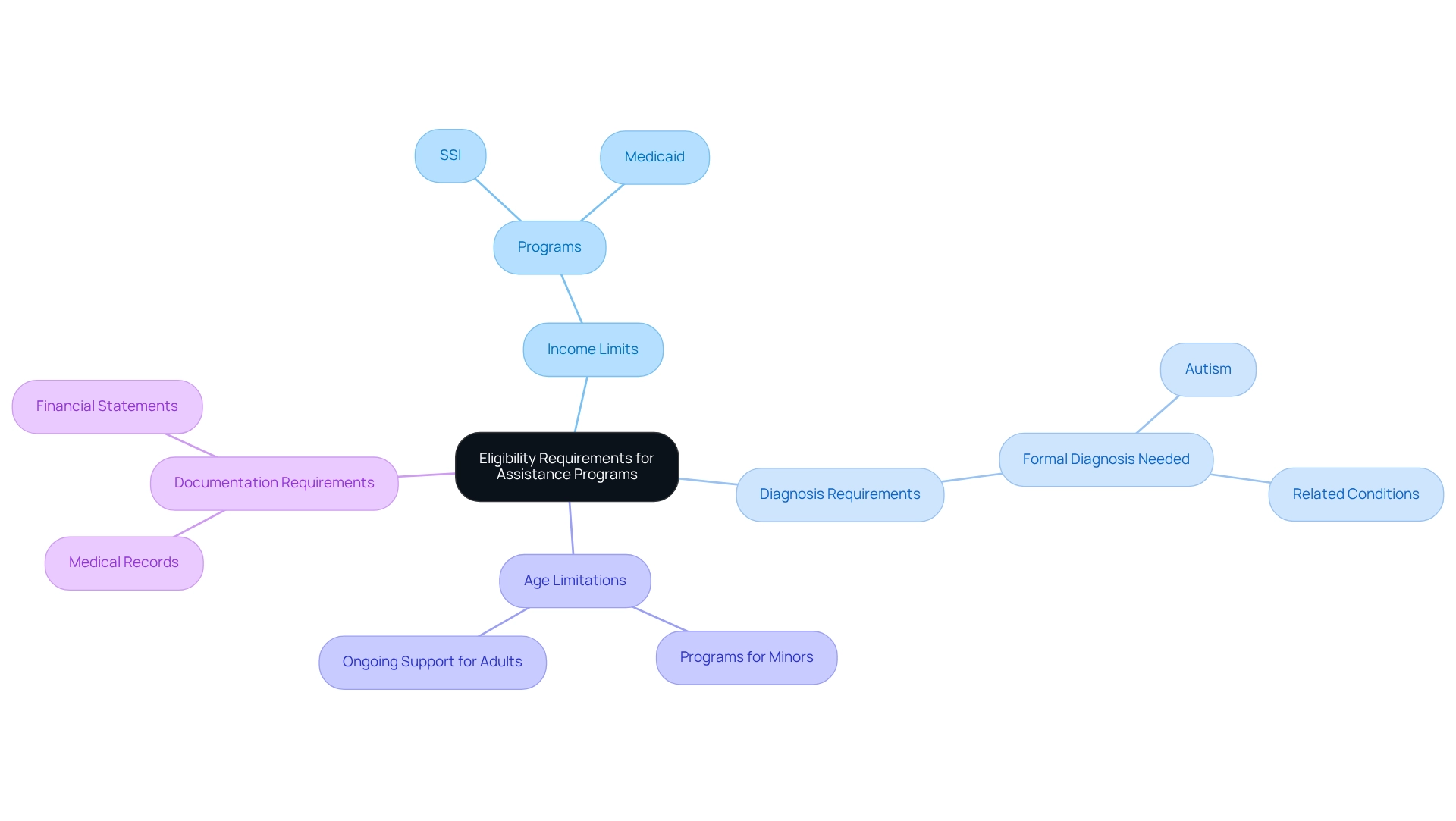
Step-by-Step Application Process for Assistance
Navigating the application process for government assistance can feel overwhelming, but by following these structured steps, families can simplify their experience:
-
Research Initiatives: Begin by identifying the support initiatives that align with your child's specific needs and your family's financial circumstances. Understanding the eligibility criteria is crucial for a successful application for government assistance for autism. Recent statistics indicate that the average duration required to handle applications for government assistance for autism support initiatives is roughly 6 to 8 weeks, so it's essential to plan accordingly.
-
Gather Documentation: Compile all necessary documentation, which typically includes proof of income, medical records, and any other pertinent information required by the initiatives. Having these documents organized will streamline the application process. Many families have reported that creating a checklist of required documents helped them stay on track and feel more prepared.
-
Complete Applications: Carefully fill out the application forms for each program. Ensure that all information is accurate and complete, as discrepancies can lead to delays or denials. One parent shared, "Double-checking every detail before submission made a huge difference in our experience." This attention to detail can truly ease the process.
-
Submit Applications: Send your completed applications to the appropriate agencies. Remember to keep copies of everything you submit for your records, as this will be helpful for future reference. Some households have discovered it advantageous to send applications through certified mail to guarantee their receipt, providing peace of mind.
-
Follow Up: After submitting your applications, proactively follow up with the agencies to check on the status of your application. Be prepared to provide any additional information they may request. Experts recommend following up at least once a month to stay informed about your application status, ensuring you remain engaged in the process.
By remaining organized and proactive throughout this journey, households can significantly improve their chances of successfully obtaining the assistance they require. Recent news emphasizes that government assistance for autism initiatives are continually evolving, making it beneficial to stay informed about any changes. Remember, you are not alone in this process; many families are navigating similar paths, and support is available.
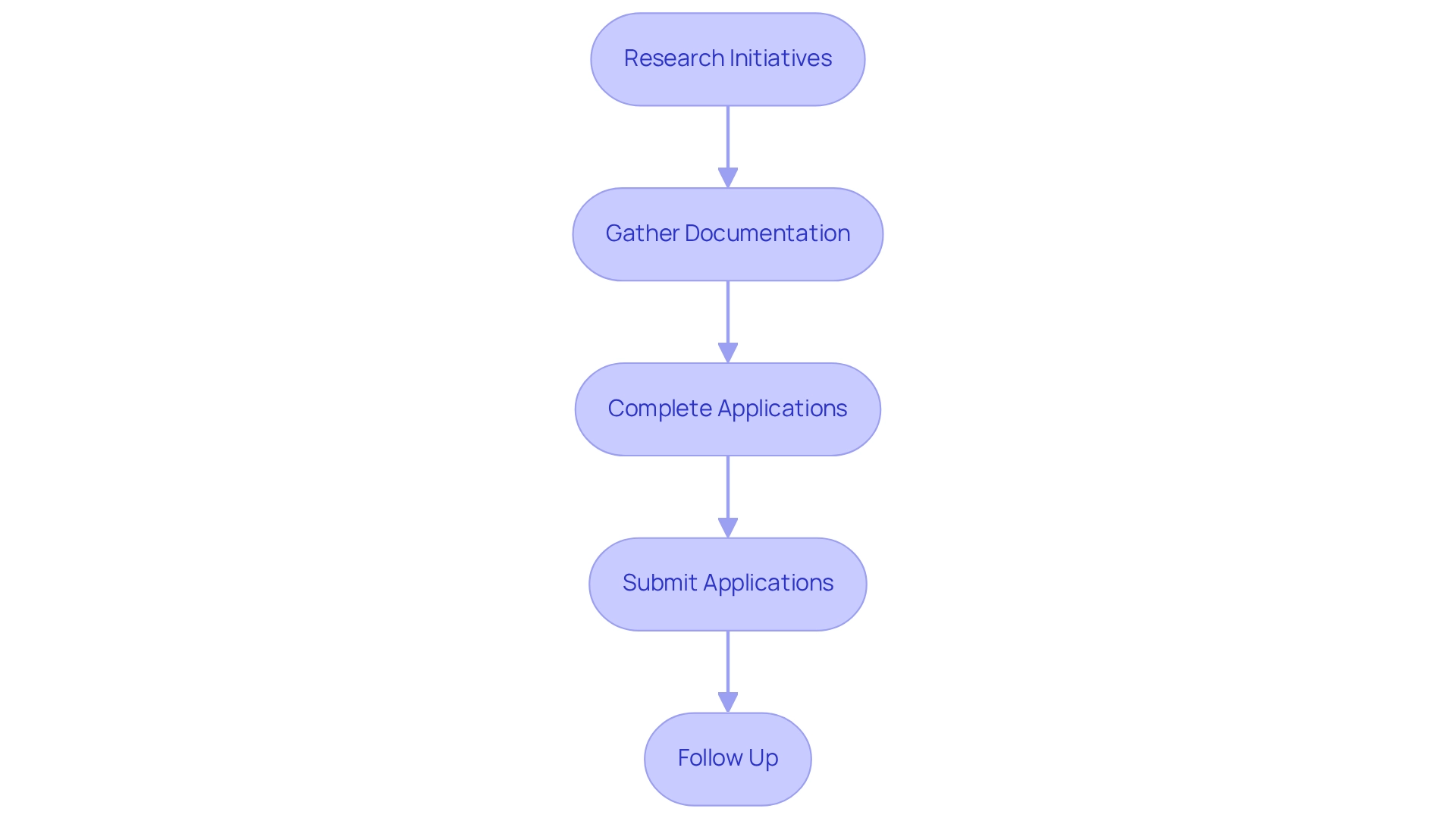
Additional Resources and Support for Parents
In addition to government assistance programs, a variety of resources are available to support families of children with autism, offering hope and connection in what can often feel like an isolating journey.
- Local Autism Support Groups: Connecting with local organizations can provide invaluable emotional support and practical advice from fellow parents. For instance, [the Autism Family Services of New Jersey (AFSNJ) organizes events like the Autism Beach Bash, which fosters community engagement and mutual assistance among families. This annual gathering, the largest of its kind in New Jersey, underscores the importance of shared experiences in navigating challenges. The next AFSNJ event is set for September 7, 2025, presenting a wonderful opportunity for families to come together and connect.
- Online Resources: Numerous websites, such as Autism Speaks and the Autism Society, offer comprehensive information on available services, funding opportunities, and advocacy strategies. These platforms serve as essential resources for families seeking guidance and support in real-time, ensuring they are not alone in their journey.
- Educational Resources: Many states provide educational assistance services tailored for children with developmental disorders, including Individualized Education Programs (IEPs) and specialized materials. These services are crucial for ensuring that children receive the appropriate support to thrive both academically and socially.
- Community Impact: Autism Family Services of New Jersey is dedicated to enhancing the quality of life for individuals affected by autism and their families. Their initiatives, such as after-school care and recreational opportunities, address the unique challenges faced by these households, fostering a sense of belonging and support.
- Personal Perspective: As Robert Schmus, MSW, LCSW, a mental health therapist and autistic self-advocate, shares, "Throughout my life as an autistic person, I have been fortunate to have experienced great moments where I have been able to socialize with others and gain long-lasting friendships." This sentiment highlights the significance of socialization and community support for autistic individuals and their families.
It is also vital to underscore the importance of Medicaid funding and advocacy advancements, which can provide essential government assistance for autism care.
Utilizing these resources can significantly diminish feelings of isolation and empower families on their journey, enabling them to access the support they need to enhance their children's development and well-being. Together, we can create a more inclusive and supportive environment for all families touched by autism.
Overcoming Challenges in Accessing Assistance
Accessing government assistance can indeed pose challenges for families, and it's important to acknowledge these hurdles. Many families encounter complex application processes that can feel overwhelming. If you find yourself in this situation, consider reaching out to local advocacy groups or professionals who specialize in navigating these systems; they can provide the support you need.
Another common issue is long wait times associated with some programs. Staying organized and following up regularly can be beneficial in keeping your application on track, ensuring that you don’t miss out on the assistance available to you.
Moreover, there is often a limited awareness of available resources. Many households may not know the full range of government assistance for autism that exists. Engaging with local organizations focused on developmental disorders can offer valuable insights and connections that might help you discover options you weren’t aware of.
By proactively addressing these challenges, families can significantly enhance their chances of successfully obtaining the assistance they need. Remember, you are not alone in this journey, and there are resources and communities ready to support you.
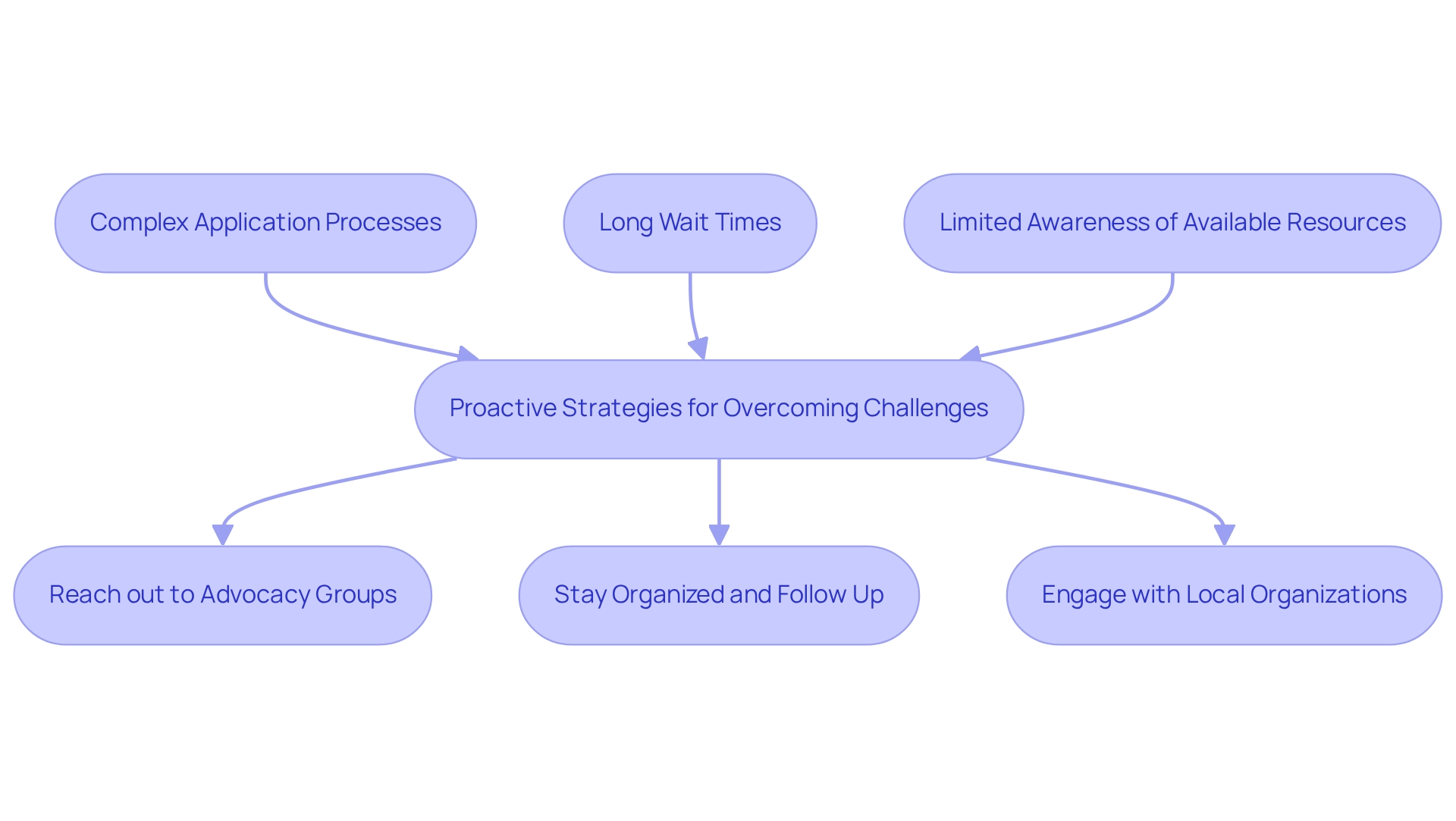
Key Takeaways for Accessing Government Assistance
Accessing government assistance for autism can feel overwhelming, but understanding the available programs and the application process can make a significant difference for families. Start by familiarizing yourself with the various types of assistance, including financial aid and healthcare services that can provide much-needed support for your child.
Utilizing financial planning tools is essential to secure your child's future, allowing you to navigate the complexities ahead. It's also important to be aware of the eligibility requirements and gather all necessary documentation before applying, ensuring a smoother process.
Following a structured application process can alleviate some stress, and don’t hesitate to seek help when needed. Remember, you are not alone in this journey. Engaging with additional resources and assistance networks can enhance your advocacy efforts, connecting you with others who share similar experiences.
By taking these thoughtful steps, families can effectively access government assistance for autism, ultimately enhancing the lives of their children. Your proactive approach can lead to meaningful support and a brighter future.
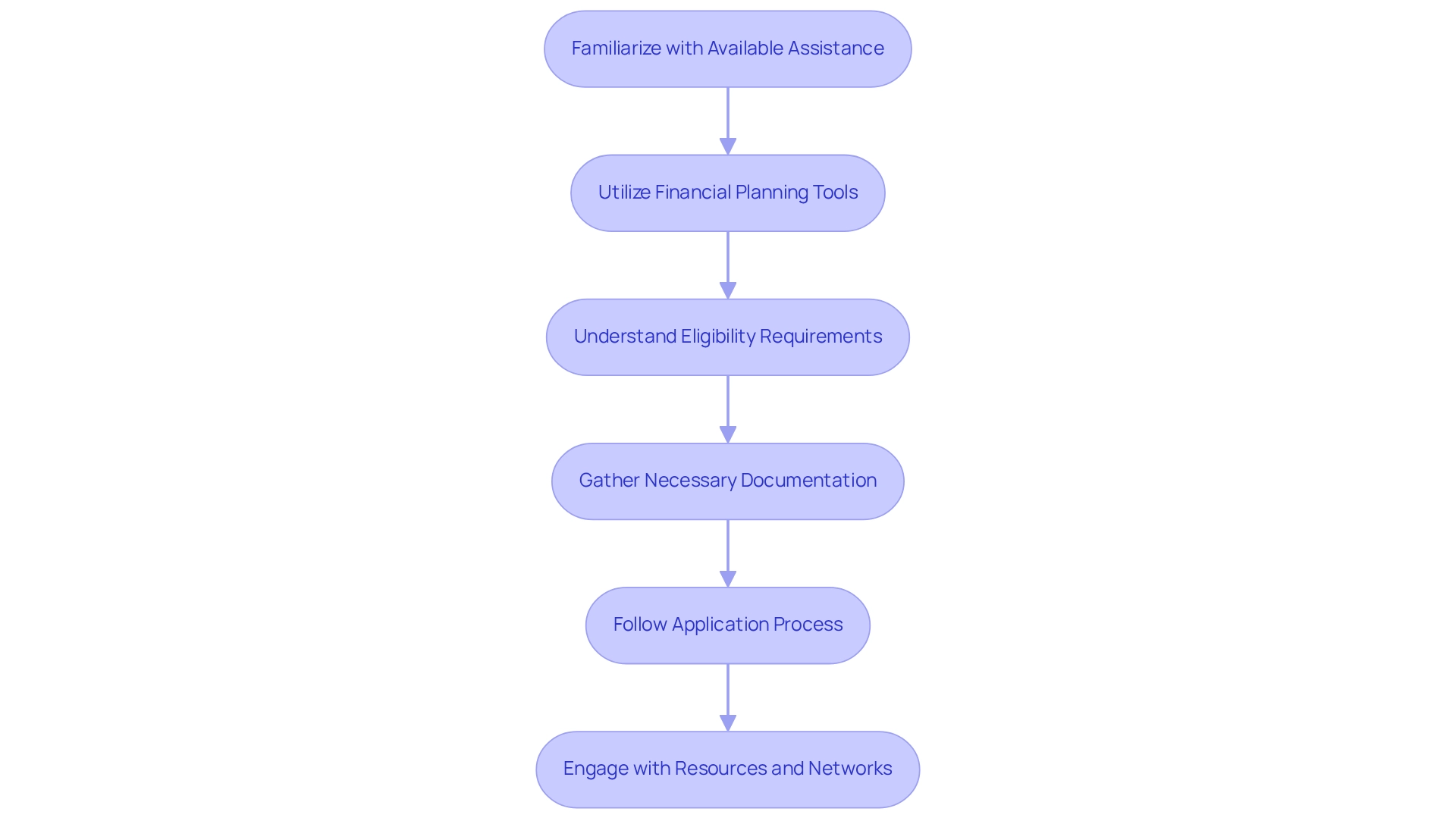
Conclusion
Understanding government assistance for autism is vital for families seeking essential support in navigating the complexities of care and available resources. This article highlights various programs, including Supplemental Security Income (SSI) and Medicaid, which serve as foundational support for children with autism. These programs, along with state-specific initiatives, provide financial aid, healthcare services, and educational resources crucial for enhancing the quality of life for affected families.
Being informed about eligibility requirements and the application process is incredibly important. Families are encouraged to familiarize themselves with the intricacies of each program and utilize financial planning tools, such as Special Needs Trusts and ABLE Accounts, to ensure a secure future for their children. Successful case studies demonstrate the positive impact of these resources, emphasizing the need for proactive advocacy and continuous engagement with community support networks.
Navigating government assistance for autism can indeed be challenging, but it is also filled with potential for positive outcomes. By understanding available resources, leveraging financial planning tools, and actively participating in support networks, families can significantly improve their children's access to necessary services and enhance their overall well-being. Our collective effort to raise awareness and advocate for better support systems is essential in creating a brighter future for children with autism and their families.
Frequently Asked Questions
What types of government assistance are available for autism in 2025?
Government assistance for autism includes financial aid, healthcare services, and educational support, with key programs like Medicaid and Supplemental Security Income (SSI) being crucial for families.
How many households with autistic children access government aid?
Approximately 40% of households with autistic children access some form of government aid, highlighting the importance of these services.
What is the role of Medicaid in supporting families with autistic children?
Medicaid provides comprehensive healthcare coverage, including therapies such as Applied Behavior Analysis (ABA), which are essential for many children with autism.
What is Supplemental Security Income (SSI) and how does it help families?
SSI offers monthly payments to eligible children with disabilities, including autism, providing vital financial support to families with limited income.
Are there state-specific programs available for autism assistance?
Yes, many states have established their own initiatives to provide tailored assistance for families, including funding for therapy and educational resources.
What impact does technology have on support for individuals with autism?
Various organizations provide grants for technology, such as iPads, which can enhance communication and education for individuals with autism, improving developmental outcomes.
How can families apply for government assistance for autism?
Families are encouraged to thoroughly research available options and apply as soon as possible. Engaging with community-based organizations (CBOs) can also provide additional support.
What should families know about eligibility for government assistance programs?
Eligibility requirements can differ significantly between federal and state initiatives, so it's important for families to understand these criteria to access the benefits available.
Can a child placed in an enrollee's residence by a welfare agency receive government assistance?
No, a child placed by a welfare agency under an agreement where the agency maintains oversight is not considered a foster child for coverage, which can affect eligibility.
Why is ongoing research important for government assistance initiatives for autism?
Ongoing research helps evaluate and improve assistance initiatives, ensuring they adopt innovative methodologies that can enhance support for individuals with autism.




